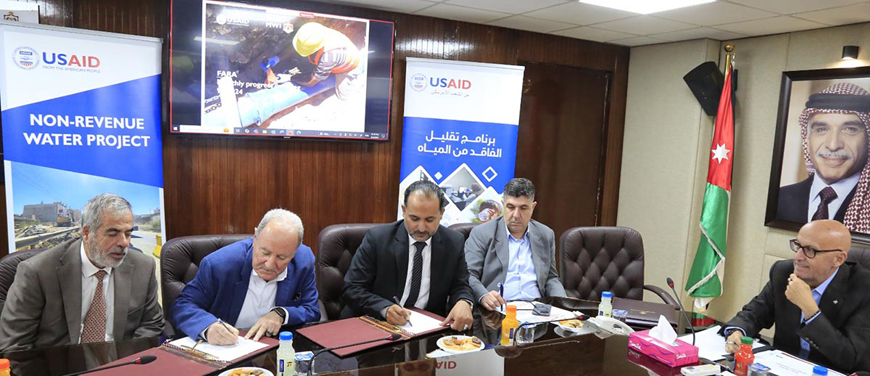You are here
Jordan, USAID sign two agreements to boost water infrastructure
By JT - Sep 03,2024 - Last updated at Sep 03,2024

The Ministry of Water and Irrigation on Tuesday signs two agreements with the United States Agency for International Development to improve Jordan's water infrastructure (Petra photo)
AMMAN — The Ministry of Water and Irrigation on Tuesday signed two agreements with the United States Agency for International Development (USAID) to improve Jordan's water infrastructure.
The first agreement, worth $35 million, focuses on reducing water losses and improving supply, with an additional contribution of $10.5 million from the Jordan Water Company (Miyahuna).
The second agreement, worth $10.9 million, will rehabilitate 13 kilometres of the King Abdullah Canal. The project, part of a wider initiative to reduce water losses, is supported by an additional contribution of $4.4 million from the German government through the German Development Bank (KfW).
Minister of Water and Irrigation Raed Abul Saud, who attended the signing ceremony, stressed the importance of enhancing water resources, reducing water losses, and conserving water for drinking and agricultural purposes.
These projects align with the ministry's strategic plan to develop the water system, especially in the Jordan Valley, and to reduce water losses in the Kingdom to less than 25 per cent, the minister said.
Abul Saud expressed his appreciation for the continued support of USAID and the KfW, stressing that their contributions are "vital" to protecting Jordan's limited water resources.
He added that this support is "critical" to addressing the Kingdom's water challenges by providing technical and technological assistance to improve system performance and reduce water losses.
Director of the Water and Environment Office at USAID Laura Gonzalez reiterated the agency's commitment to providing technical and technological assistance, improving the performance of water sector companies, and upgrading water infrastructure.
She emphasised that these efforts are essential for the long-term management of Jordan's water resources to build a resilient water sector and boost the Kingdom's water security.
Once completed, the project is expected to produce 3.34 million cubic metres of water annually, which will be redirected to increase water supplies in key governorates served by the canal, including Amman, Irbid, and Balqa.
Related Articles
AMMAN — The Water Ministry and the United States Agency for International Development (USAID) on Monday signed an agreement valued at $11 mi
AMMAN — The Ministry of Water and Irrigation and the United States Agency for International Development (USAID) on Tuesday signed an agreeme
AMMAN — The Sustainable Wastewater Management Project aims to improve and expand wastewater services throughout the Kingdom, Minister of Wat















